Greece
Factsheet
| ETHNIC MINORITIES: | |
|
Roma: Foreign citizens: |
2.47% 7% |
| RELIGIONS: | |
|
Greek Orthodox: Muslim: |
98% 4.7% |
| NET MIGRATION: | 154,000 |
| POP. GROWTH RATE: | -0.2% |
| GDP GROWTH: | -2.6% |
| GDP PER CAPITA: | 22,083 |
| UNEMPLOYMENT: | 24.3% |
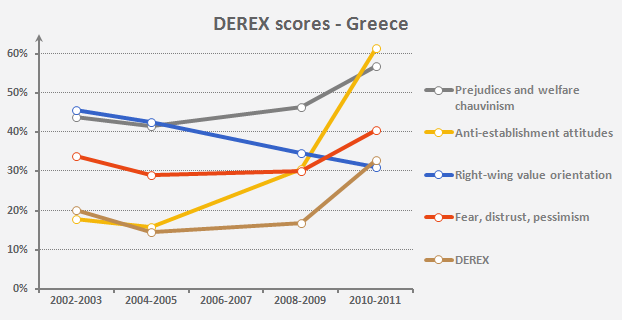
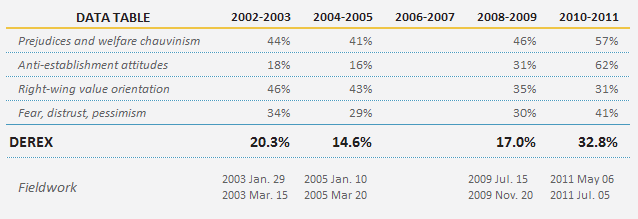
Golden Dawn (Χρυσή Αυγή, XA)

XA on the Internet:
Sources:
- Maria Margaronis: “Fear and loathing in Athens: the rise of Golden Dawn and the far right.” In The Guardian 26 October 2012. Available online at: http://www.guardian.co.uk/world/2012/oct/26/golden-dawn-greece-far-right
- William Wheeler: “Europe’s New Fasists.” In The New York Times 17 November 2012. Available online at: http://www.nytimes.com/2012/11/18/opinion/sunday/europes-new-fascists.html?pagewanted=all
- Political Capital

Popular Orthodox Rally (Λαϊκός Ορθόδοξος Συναγερμός, LAOS)
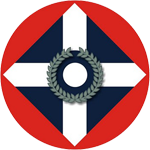
The Popular Orthodox Rally (Λαϊκός Ορθόδοξος Συναγερμός, LAOS), a right-wing nationalist party, was formed by Giorgos Karatzaferis in 2000 after he was expelled from New Democracy following his criticism of party leader Costas Karamanlis. While LAOS initially adopted an ultra-nationalist line and welcomed members with an extremist past, the party has, at least publicly, gradually eased some of its rhetoric, although it remains a strong opponent of immigration.LAOS was the only party apart from PASOK to vote in favor of the first bailout in 2010 and became a junior partner in the coalition government formed in November 2011. Karatzaferis, however, decided to quit the administration shortly before the second loan agreement was voted in Parliament. The party's short membership in the interim government has caused some voters to flee to far-right parties such as Golden Dawn. Today, LAOS has fallen in vote results, with a score of 1.03% in the latest national elections.
Regarding its platform, LAOS wants the mass repatriation of illegal immigrants in a bid to curb crime and unemployment, and has called for a change in the law to allow victims to shoot robbers. It also wants Germany to pay war reparations for crimes committed by the Nazi regime during its invasion of Greece in World War II. LAOS also supports tax cuts and a hard line against Turkey.
LAOS on the Internet:
Sources:
- Political Capital
Parliamentary elections - March 11, 2015
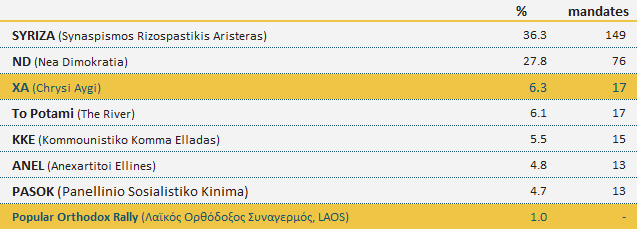

European elections - May 25, 2014


Parliamentary elections - June 17, 2012
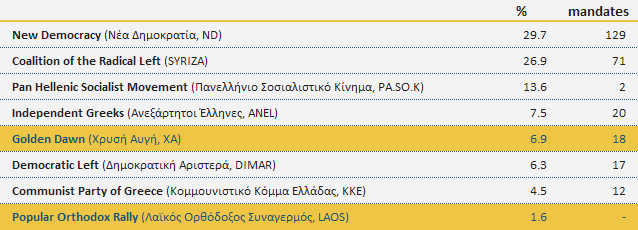

Our thematic websites
Political Capital's analyses and activities in English.
Research and advocacy programme focused on the role conspiracy theorising plays in shaping populist and radical politics.
Our project New electoral system in Hungary: watchdogging, advocacy and raising awareness focuses on the electoral reform in Hungary.
Our blog on political and societal extremism and conspiracy theories.
DEREX website is supported by











